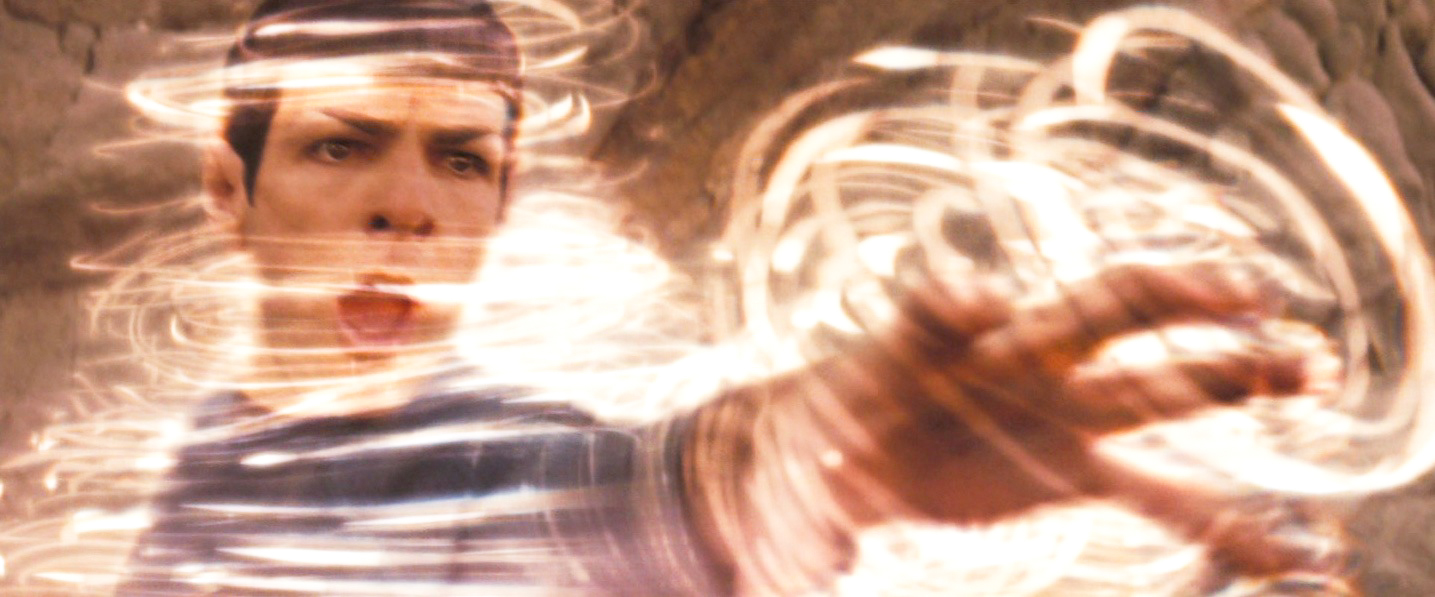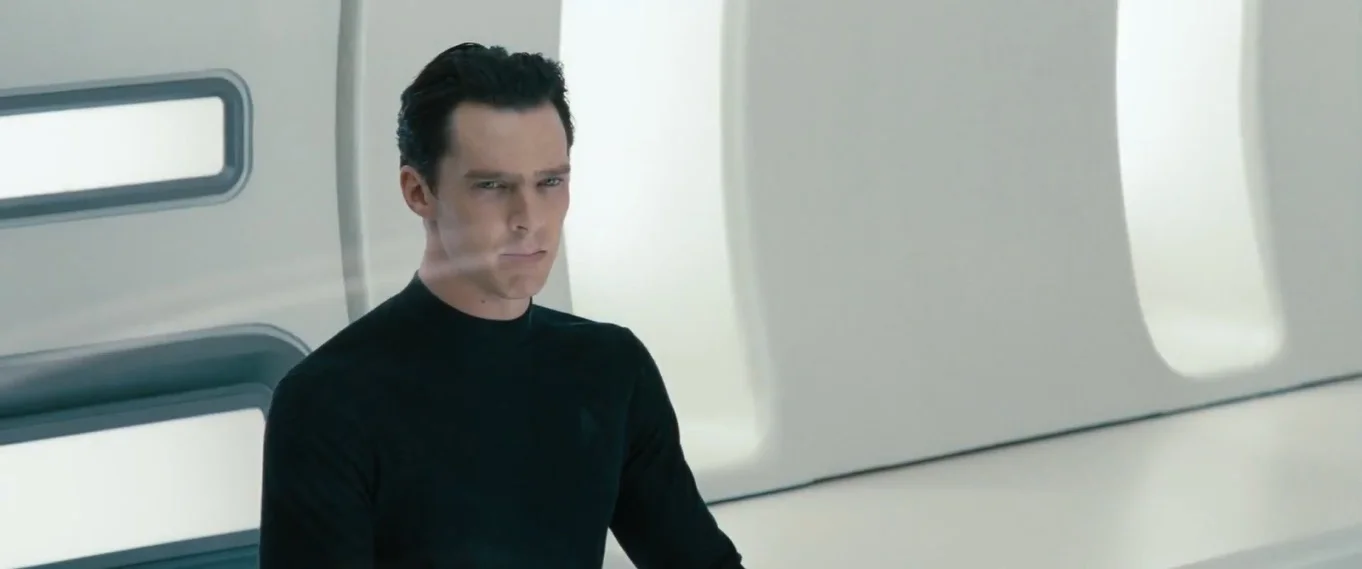Vulcan's destruction was a 9/11 event.
Some Trekkies believe J.J. Abrams's first Star Trek film didn't include social commentary, that it didn't tackle the issues of our time. But that's just not true. Vulcan's destruction was a 9/11 attack against the United Federation of Planets. It occurred by an unknown terrorist, brought an end to feelings of safety, and seismically changed what it meant to be a citizen of the Federation - just like 9/11 in America.
This isn't my idea. I got it from Damon Lindelof, one of the guys who produced Star Trek:
“We often referred to the destruction of Vulcan as the 9/11 moment of [Star Trek]. There had to be an event that was so significant that it allows you to change the Trek universe, not just for the purposes of the first movie, but moving forward. The idea of saying, if you did something that huge, what would be the effect of that rippling outwards?”
This week we get to see the sequel, Star Trek Into Darkness. It's clear from the trailers and interviews that the new film continues the 9/11 thread of the first. Here's how Chris Pine (Captain Kirk) described the movie:
“It’s about terrorism, about issues we as human beings in 2013 deal with every day, about the exploitation of fear to take advantage of a population, about physical violence and destruction but also psychological manipulation. John Harrison is a terrorist in the mold of those we’ve become accustomed to in this day and age.”
Since we have over a decade of research on how America changed after 9/11, I wondered if I could we use the psychology of terrorism to predict the events of Star Trek Into Darkness? This is my attempt to do just that.
A quick note before we get started. Even though Star Trek Into Darkness is already out in many parts of the world, I don't know what actually happens in the film. I did get a spoiler over the weekend (which led to a rant about how spoilers are evil), but that spoiler wasn't related to the larger plot of the movie. My predictions are purely based on my knowledge of psychological science as well as exposure to canonical content (e.g. Star Trek Into Darkness trailers, Countdown to Darkness graphic novel, and Star Trek: The Video Game). There are no spoilers in this article, just my educated guesses.
Prediction #1: Starfleet Is Emotionally Compromised
Their is clear scientific consensus that 9/11 increased rates of post-traumatic stress disorder (PTSD). Even people who weren't directly exposed to the devastation of the attacks were at risk for trauma, leading some scientists to question the way we diagnose PTSD. While rates came down to normal a few years after 9/11, the two groups that continued to be at an increased risk for PTSD were first responders and immediate victims of the attack. First responders had multiple exposures to trauma while survivors faced years of chronic stress as they rebuilt their lives.
These findings make two groups at risk for PTSD in Star Trek - Starfleet officers and Vulcans. Starfleet, the Federation's first responders, witnessed the destruction of their fleet and the genocide of the Vulcan people. Many of them were also probably involved with humanitarian efforts after the attack, furthering their exposure to trauma. We know about 10,000 Vulcans (out of 6 billion) escaped the destruction of their planet. Every surviving Vulcan has been impacted by this attack, lost loved ones, and saw their home destroyed (through a viewscreen or on the news). Many Vulcans were exposed to additional trauma when the Gorn attacked New Vulcan (see Star Trek: The Video Game).
The person most likely to develop PTSD symptoms in Star Trek Into Darkness is Spock. Spock witnessed his mother’s death, saw his planet destroyed, identifies as a member of "an endangered species", and has a history of struggling with emotions (he attacked kids who were teasing him for being half Human/half Vulcan and attacked Kirk on the bridge of the Enterprise). We've already seen him re-experiencing the trauma of Vulcan's destruction in Countdown to Darkness. The movie will give us a deeper look into how Spock is responding to these traumatic events.
Prediction: We'll see Spock re-experience the trauma of Vulcan's destruction, try to numb his pain, and lose complete emotional control (and probably beat the crap out of someone).
Prediction #2: Xenophobia Will Rise
Star Trek Into Darkness may focus on Klingon xenophobia.
Discrimination against Arab and Muslim Americas skyrocketed post 9/11. Between 1998 to 2000, there were less than 10 incidents of Anti-Arab/Muslim hate crimes. Compare that with the 700 reported in the first 9 months after 9/11. Since the terrorists involved in the hijackings couldn't be brought to justice, many Americans took out their anger on those they thought looked like the enemy (which was based purely on prejudice and stereotypes).
I don't think we'll see the Federation become prejudiced towards Romulans (they look just like Vulcans). Instead, the Federation is going to become highly cautions of unknown alien threats in the galaxy (probably the Klingons, since they're in Countdown to Darkness). This post-Vulcan Federation won't be as inclusive and welcoming as the old – it’s been changed. To paraphrase Jack Beatty, this Federation has been "expelled from Utopia".
Prediction: Starfleet will act with extreme prejudice against the Klingons (for no reason) and see them as a threat to the Federation.
Prediction #3: The Prime Directive Will Be Challenged
Starfleet Command will debate breaking its guiding rule #1.
Research into the political aftermath of 9/11 is messy. Studies have revealed different, sometimes conflicting, findings. Some saw an increase in American conservatism after 9/11. Others identified a polarization of existing politics - liberals became more liberal, conservatives more conservative.
One of the most interesting, experimental, findings was the relationship between artificially created anxiety and anger in political decision-making. People who felt anxiety about terrorism endorsed opposition to aggressive domestic and foreign policies (e.g. increased homeland security, war against Iraq, etc.) while anger strongly increased support for war aboard. This makes sense - anxiety makes us exaggerate dangers and avoid situations while anger reminds us that we've been wronged and pushes us towards conflict. Even though anger and anxiety waxed and waned in the 2000s, American politics led to an erosion of individual freedoms in the interest of national security.
Star Trek Into Darkness will explore a similar theme. The focus won't be on civil liberties. Rather, the Federation may break its general order number 1: the Prime Directive. Countdown to Darkness is all about a character ignoring the Prime Directive for the sake of saving innocent lives. We're going to see a similar debate in this movie. Maybe even Section 31, Starfleet's covert intelligence agency, will be involved.
Prediction: A new terrorist attack will enrage the Federation, leading it to break the Prime Directive in the interest of protecting its citizens.
Prediction #4: John Harrison Is Motivated By Humiliation
Its been difficult to study the factors that influence individuals to engage in terrorism. This isn't exactly a population that's interested in contributing to research.
Most of what we know is based upon retrospective studies and field research. Some surprising findings indicate that most terrorists don't have religious education. Instead, many are college-educated professionals. This helps terrorist groups like al-Qaeda retain skilled agents. Terrorist become radicals in their late teens/early 20s, have incomplete knowledge of their religion, and aren't motivated by religious factors or poverty.
Terrorists are motivated by their social network (i.e. peer pressure), the belief that a foreign power has interfered with their country, an ingroup/outgroup identity (it's us versus them), and a sense of national humiliation. The humiliation is a big deal - feeling as though their people experienced problems under a foreign occupation (like marginalization), experienced chronic frustrations, and lost significance are good predictors of radical terrorism.
The villain in Star Trek Into Darkness is Benedict Cumberbatch's John Harrison. Who Harrison is, what he does, and what motivates him has been the topic of intense debate on the internet. Some think he is Khan, Star Trek's most iconic villain. I don't think he is Khan, but I do think he's a genetically augmented human like Khan, potentially one of Khan's allies. Like most terrorists, Harrison will be motivated by strong humiliation. Harrison will discover a plan by the Federation to persecute his people (augmented humans) and he will strike back with a campaign of terrorism.
Prediction: John Harrison, a Section 31 agent, discovers a Federation plot to kill augmented men, women, and children. In retaliation, he attacks Starfleet Headquarters.
Prediction #5: Resilience & Altruism Flourish
Someone will sacrifice their life in Star Trek Into Darkness.
Americans met the challenge of 9/11 with resiliency and altruism. In the immediate aftermath of 9/11, people felt closer to one another, made blood donations, volunteered, contributed to charity, and increased trust in their communities. Character strengths of gratitude, hope, kindness, leadership, love, spirituality, and teamwork also significantly increased. Why did this happen? After large disasters, our sense of responsibility to each other increases, thereby encouraging acts of altruism. What was unique about 9/11 was American's strong desire to learn more about Islam - the Quran became a bestselling book and many efforts were put into place to increase religious understanding between different communities.
Gene Roddenberry's vision of Star Trek is an optimistic future. Therefore, Into Darkness will demonstrate humanity at its best. The crew will face immense challenges, but they’ll remain resilient in the face of traumatic stress. The Federation might engage in questionable moral actions, but Kirk will correct the Federation's mistakes. Someone will demonstrate ultimate altruism by sacrificing their life to save Earth.
Prediction: Kirk will do the right thing, even if it means losing his command. A member of the crew (not Spock) will sacrifice their life to save Earth.
This wraps up my countdown to Star Trek Into Darkness. Come back Sunday for my initial non-spoiler review of the film and check back in a few weeks for my analysis of the psychology of Star Trek Into Darkness.






